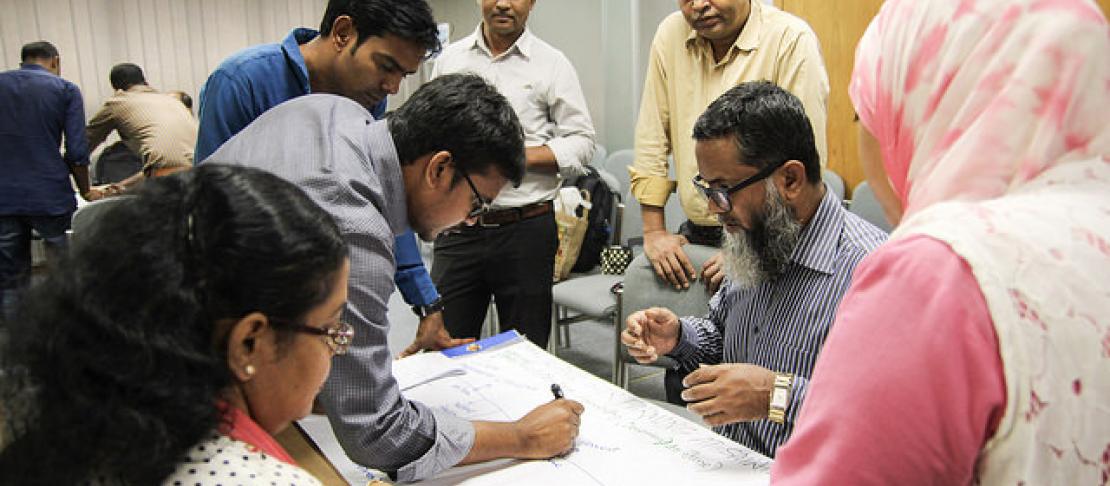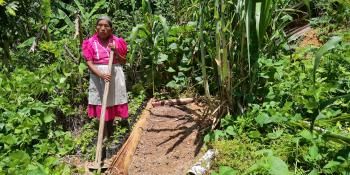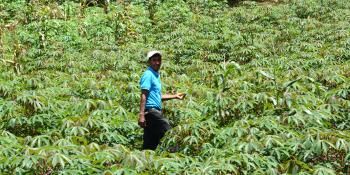Newly founded Bangladesh Academy for Climate Services held its first training course

Sector leaders in Bangladesh gathered at the Bangladesh Academy for Climate Services's training to learn about climate services and using climate information in decision-making.
Jointly founded by the International Center for Climate Change and Development (ICCCAD), the International Research Institute for Climate and Society (IRI) at Columbia University, Bangladesh Meteorological Department (BMD) and the International Maize and Wheat Improvement Center (CIMMYT), the Bangladesh Academy for Climate Services (BACS) was inaugurated in August this year at the BMD. Supported by the Adapting Agriculture to Climate Today, for Tomorrow (ACToday) project, part of Columbia World Projects, the academy aims to embed climate thinking in decision-making processes and close the gap between climate information providers and end users.
The 5-day training comprised of educational discussion sessions, informative presentations, question and answer sessions, and a field visit to Manikganj, a district next to Dhaka. During the training, participants learned the basics of climate science, climate services and available products, as well as strategies that would enhance the use of climate services.
“We would like to be able to use forecasts to anticipate future disasters and act early to mitigate losses. Therefore, understanding how to translate and apply the forecasts is of importance to me” said one of the participants, Lamiya Mahpara Ahmed, Analyst at Start Fund Bangladesh. “Similarly, learning the feasibility and limitations of climatology will help us design our forecasting needs.” The course focused mainly on a deeper understanding of climate services as well as the challenges and expectations involved.
Thirty participants from private sector, educational institutes, government departments, and international NGOs attended the training held at BMD’s headquarters. The field visit component enabled the participants to put the decision-making flowchart (DMF) for climate services studied during the training to practice in a real-life setting with farmers.
From this training—especially from the field visit—I became confident about my learning regarding climate, forecasting, and its implication in agriculture in the field. This learning will definitely help me in my research.”
Sheikh Samsul Alam, Scientific Officer, Bangladesh Agricultural Research Institute in Barishal
At the end of the training, participants also identified climate-sensitive decisions within their respective fields and developed an understanding of existing decision-making processes. Equipped with this knowledge, participants can better understand their demands for climate information as well critically assess the current use of climate information within their field.
As a development practitioner, without much technical background in climate services, this course has been significantly important for me in building competency on relevant issues like weather forecasting, the uses of climate data, the cope and limitations of climate services, as well as the challenges involved.”
Hossain Ishrath Adib, Head of Programme Implementation, Practical Action
Through the training, the participants became better connected with the trainers and organizing partners—particularly BMD— for inquiries, ideas, and questions regarding the course materials as well as climate services and climate forecasts in Bangladesh. The participants also joined a BACS Facebook group to stay in touch with one another and with the next training cohorts. In a few months, the participants will meet again to discuss how they have applied the information from the course and to learn from each other’s experience.
Read More:
- Project page: Climate Services for Resilient Development (CSRD) in South Asia
- Project page: Adapting Agriculture to Climate Today, for Tomorrow (ACToday)
- News update: Expanding Horizons: Bangladesh Academy for Climate Services (BACS)
- News: Bangladesh Academy for Climate Services launched
M. Shahidul Haque Khan is a Communications Officer at the International Maize and Wheat Improvement Center (CIMMYT). Sultana is a Communications Intern at the International Maize and Wheat Improvement Center (CIMMYT). Dannie Dinh is a Communications Officer for the CGIAR Research Program on Climate Change, Agriculture and Food Security (CCAFS) and a Program Officer at the International Research Institute for Climate and Society (IRI).


